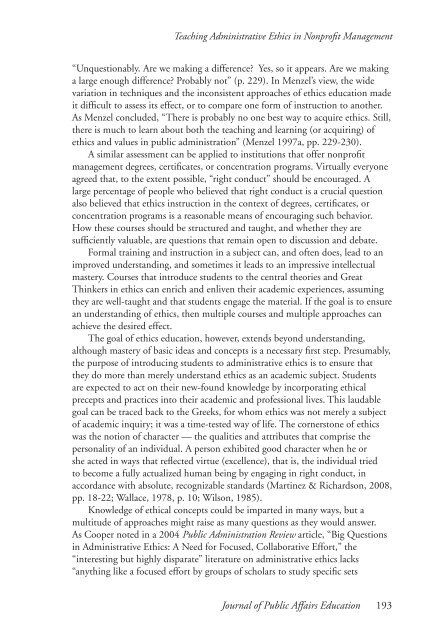JOURNAL OF PUBLIC AFFAIRS EDUCATION - Naspaa
JOURNAL OF PUBLIC AFFAIRS EDUCATION - Naspaa
JOURNAL OF PUBLIC AFFAIRS EDUCATION - Naspaa
You also want an ePaper? Increase the reach of your titles
YUMPU automatically turns print PDFs into web optimized ePapers that Google loves.
Teaching Administrative Ethics in Nonprofit Management“Unquestionably. Are we making a difference? Yes, so it appears. Are we makinga large enough difference? Probably not” (p. 229). In Menzel’s view, the widevariation in techniques and the inconsistent approaches of ethics education madeit difficult to assess its effect, or to compare one form of instruction to another.As Menzel concluded, “There is probably no one best way to acquire ethics. Still,there is much to learn about both the teaching and learning (or acquiring) ofethics and values in public administration” (Menzel 1997a, pp. 229-230).A similar assessment can be applied to institutions that offer nonprofitmanagement degrees, certificates, or concentration programs. Virtually everyoneagreed that, to the extent possible, “right conduct” should be encouraged. Alarge percentage of people who believed that right conduct is a crucial questionalso believed that ethics instruction in the context of degrees, certificates, orconcentration programs is a reasonable means of encouraging such behavior.How these courses should be structured and taught, and whether they aresufficiently valuable, are questions that remain open to discussion and debate.Formal training and instruction in a subject can, and often does, lead to animproved understanding, and sometimes it leads to an impressive intellectualmastery. Courses that introduce students to the central theories and GreatThinkers in ethics can enrich and enliven their academic experiences, assumingthey are well-taught and that students engage the material. If the goal is to ensurean understanding of ethics, then multiple courses and multiple approaches canachieve the desired effect.The goal of ethics education, however, extends beyond understanding,although mastery of basic ideas and concepts is a necessary first step. Presumably,the purpose of introducing students to administrative ethics is to ensure thatthey do more than merely understand ethics as an academic subject. Studentsare expected to act on their new-found knowledge by incorporating ethicalprecepts and practices into their academic and professional lives. This laudablegoal can be traced back to the Greeks, for whom ethics was not merely a subjectof academic inquiry; it was a time-tested way of life. The cornerstone of ethicswas the notion of character — the qualities and attributes that comprise thepersonality of an individual. A person exhibited good character when he orshe acted in ways that reflected virtue (excellence), that is, the individual triedto become a fully actualized human being by engaging in right conduct, inaccordance with absolute, recognizable standards (Martinez & Richardson, 2008,pp. 18-22; Wallace, 1978, p. 10; Wilson, 1985).Knowledge of ethical concepts could be imparted in many ways, but amultitude of approaches might raise as many questions as they would answer.As Cooper noted in a 2004 Public Administration Review article, “Big Questionsin Administrative Ethics: A Need for Focused, Collaborative Effort,” the“interesting but highly disparate” literature on administrative ethics lacks“anything like a focused effort by groups of scholars to study specific setsJournal of Public Affairs Education 193
















